This building in Nigeria could be the world's most futuristic school
But don't expect steel and glass: this classroom floats on recycled materials
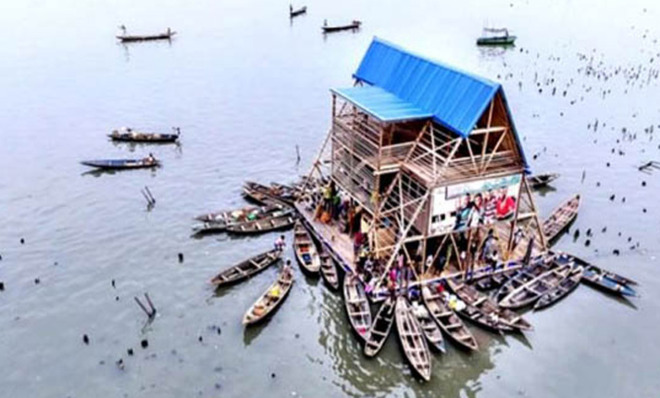
A free daily email with the biggest news stories of the day – and the best features from TheWeek.com
You are now subscribed
Your newsletter sign-up was successful

The children of Makoko, a waterfront slum in Lagos, Nigeria, might have the world's most futuristic school. It's just been shortlisted for the Design of the Year 2014 award by London's Design Museum and it's easy to see why.
The Makoko Floating School is a minimalist, open-air structure that combines the adaptive insights of the local community with the best principles of sustainable development.
The three-story, A-frame building floats on recycled plastic barrels and maintains stability, even in heavy winds, thanks to a low center of gravity.
The Week
Escape your echo chamber. Get the facts behind the news, plus analysis from multiple perspectives.

Sign up for The Week's Free Newsletters
From our morning news briefing to a weekly Good News Newsletter, get the best of The Week delivered directly to your inbox.
From our morning news briefing to a weekly Good News Newsletter, get the best of The Week delivered directly to your inbox.
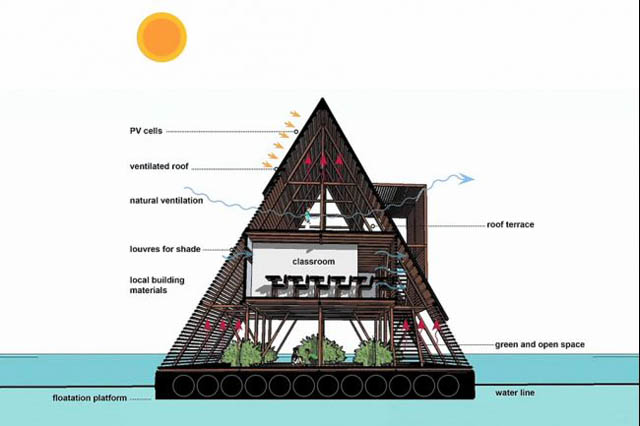
A diagram of the Makoko Floating School, designed by Nigerian architect Kunlé Adeyemi and his Lagos- and Amsterdam-based firm NLÉ. (YouTube/Screenshot)
The first level of the school is a flexible, multi-use playground that transforms into a community space when class is out. The second and third levels contain enclosed classroom and workshop space for up to 100 students, who travel to and from the school by canoe.
Makoko carpenters built the school from locally-sourced wood, bamboo, and other eco-friendly materials. It's also partially self-sustaining, thanks to solar panels on the roof and a rain harvesting system that operates the toilets.
Nigerian architect Kunlé Adeyemi and his Lagos and Amsterdam-based firm NLÉ designed the school as an innovative, cheap, and highly adaptable approach to Makoko's evolving social and environmental needs.
A free daily email with the biggest news stories of the day – and the best features from TheWeek.com
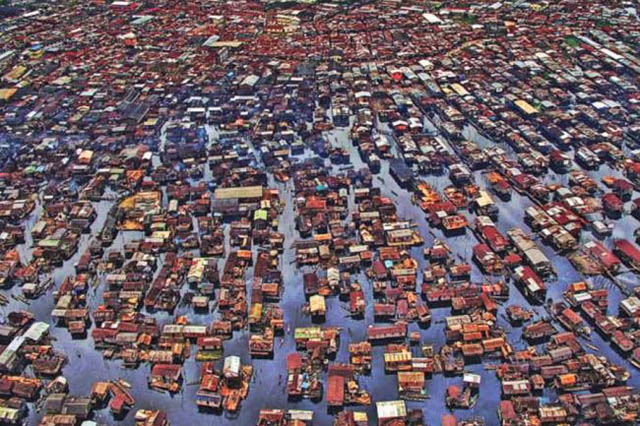
An aerial view of Makoko, a historic water community perched on the lagoon in Lagos, Nigeria. (YouTube/Screenshot)
The sprawling water community — dubbed the Venice of Africa — is home to some 150,000 people who live in rickety shanties perched on stilts above the lagoon.
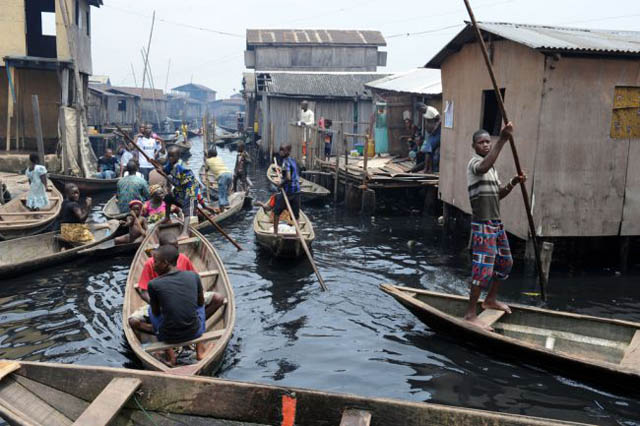
People navigate through the waterways of the Makoko slum in Lagos, on September 29, 2011.
(Pius Utomi Ekpei/AFP/Getty Images)
Heavy rainfalls and rising sea levels make flooding a constant threat.
These precarious conditions are compounded by legal and structural insecurity. The government considers Makoko to be an illegal settlement and does not provide any infrastructure for sewage, clean water, trash collection, housing, or transportation. Residents go about their daily lives by canoe and reclaim land by adding sawdust to mounds of trash.
Access to education is especially poor, with the only school built on uneven, reclaimed land — making it highly susceptible to fluctuating water levels.
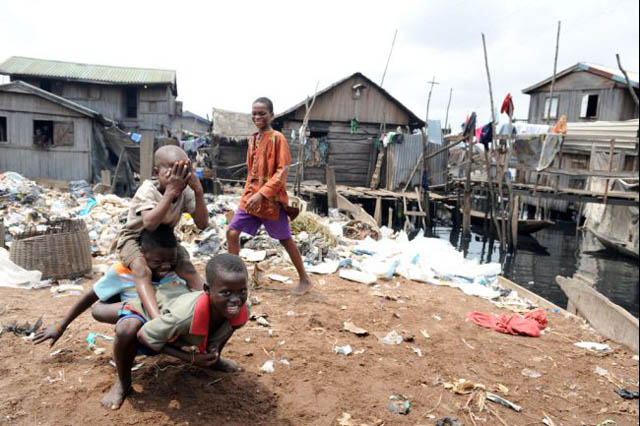
Children play next to waste in the Makoko slum in Lagos, on September 29, 2011.
(Pius Utomi Ekpei/AFP/Getty Images)
In 2012, officials demolished around 500 homes in Makoko, displacing thousands. The government stated that the slum housing was an "environmental nuisance." However, others point to the state's ongoing plans to develop the lucrative waterfront area.
After the forced evictions, Adeyemi and his team stepped in. They'd been developing the Makoko Floating School since 2011, part of a larger vision for helping vulnerable coastal cities in Africa respond to the effects of climate change and rapid urbanization.
Adeyemi proposed the floating school as a pilot project to address different issues regarding flooding, poor building structures and land titles.
The government agreed, putting the resettlement plans on hold.
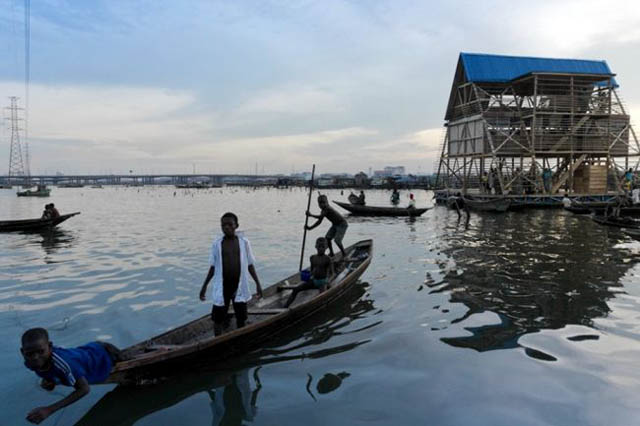
Adeyemi and his team developed the prototype structure in collaboration with the Makoko community. They received research funds from the Heinrich Böll Foundation and construction funds from the UN Development Program/Federal Ministry of Environment Africa Adaptation Program (AAP).
The result is a stunning school that promotes social and structural resilience in one of the world's most vulnerable coastal communities by incorporating water into its very design.
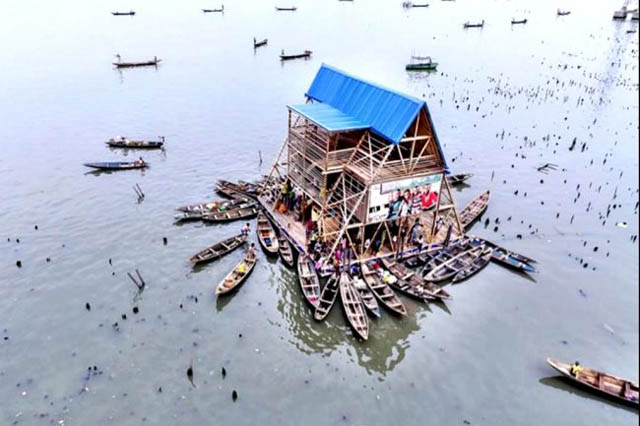
Phase two? Modular floating homes linked into neighborhoods, and perhaps even entire floating cities — marking a "new wave in resilient architecture in high-water zones," Designboom notes.
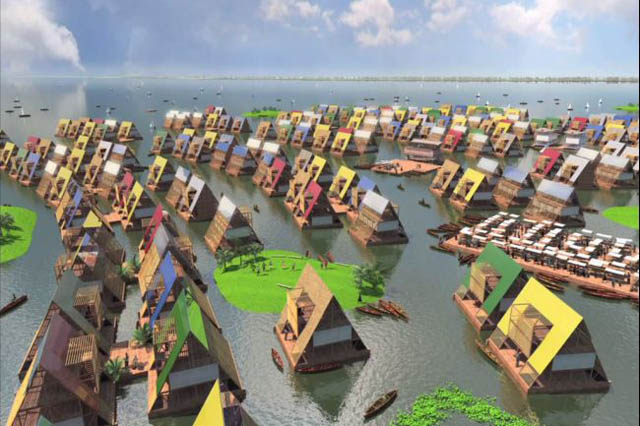
(YouTube/Screenshot)
But the Makoko Floating School, in Adeyemi's words, is "almost an island on the water, in a political sense." The Lagos State government has declared it an illegal structure and is threatening to demolish it. NLÉ is negotiating with authorities and, for the moment, believes no immediate action will be taken.
This article, by Sarah Dougherty, originally appeared in GlobalPost.
More from GlobalPost...
-
 The environmental cost of GLP-1s
The environmental cost of GLP-1sThe explainer Producing the drugs is a dirty process
-
 Greenland’s capital becomes ground zero for the country’s diplomatic straits
Greenland’s capital becomes ground zero for the country’s diplomatic straitsIN THE SPOTLIGHT A flurry of new consular activity in Nuuk shows how important Greenland has become to Europeans’ anxiety about American imperialism
-
 ‘This is something that happens all too often’
‘This is something that happens all too often’Instant Opinion Opinion, comment and editorials of the day